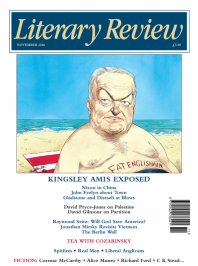Michael Jacobs
Sketches of Spain
Beaumarchais in Seville
By Hugh Thomas
Yale University Press 177pp £16
‘But Beaumarchais was never in Seville!’ asserts Hugh Thomas at the beginning of his study of the author whose Sevillian-based plays inspired, among other works, Mozart’s Marriage of Figaro and Rossini’s Barber of Seville. Thomas points out that Bizet was not there either, and nor was Verdi or Beethoven, both of whom also set operas in this part of Andalusia. He could have mentioned numerous other eighteenth- and nineteenth-century writers and musicians whose visions of southern Spain were no less imaginary, for instance Victor Hugo, who did much to establish the legendary status of Granada’s Alhambra without ever having been there himself.
‘Spain’, wrote Beaumarchais’s contemporary Voltaire, ‘is a country which we know no better than the wildest parts of Africa, and which does not merit being better known.’ Increasingly cut off from the rest of Europe in the wake of its own political and economic decline in the early seventeenth century,

Sign Up to our newsletter
Receive free articles, highlights from the archive, news, details of prizes, and much more.@Lit_Review
Follow Literary Review on Twitter
Twitter Feed
Under its longest-serving editor, Graydon Carter, Vanity Fair was that rare thing – a New York society magazine that published serious journalism.
@PeterPeteryork looks at what Carter got right.
Peter York - Deluxe Editions
Peter York: Deluxe Editions - When the Going Was Good: An Editor’s Adventures During the Last Golden Age of Magazines by Graydon Carter
literaryreview.co.uk
Henry James returned to America in 1904 with three objectives: to see his brother William, to deliver a series of lectures on Balzac, and to gather material for a pair of books about modern America.
Peter Rose follows James out west.
Peter Rose - The Restless Analyst
Peter Rose: The Restless Analyst - Henry James Comes Home: Rediscovering America in the Gilded Age by Peter Brooks...
literaryreview.co.uk
Vladimir Putin served his apprenticeship in the KGB toward the end of the Cold War, a period during which Western societies were infiltrated by so-called 'illegals'.
Piers Brendon examines how the culture of Soviet spycraft shaped his thinking.
Piers Brendon - Tinker, Tailor, Sleeper, Troll
Piers Brendon: Tinker, Tailor, Sleeper, Troll - The Illegals: Russia’s Most Audacious Spies and the Plot to Infiltrate the West by Shaun Walker
literaryreview.co.uk